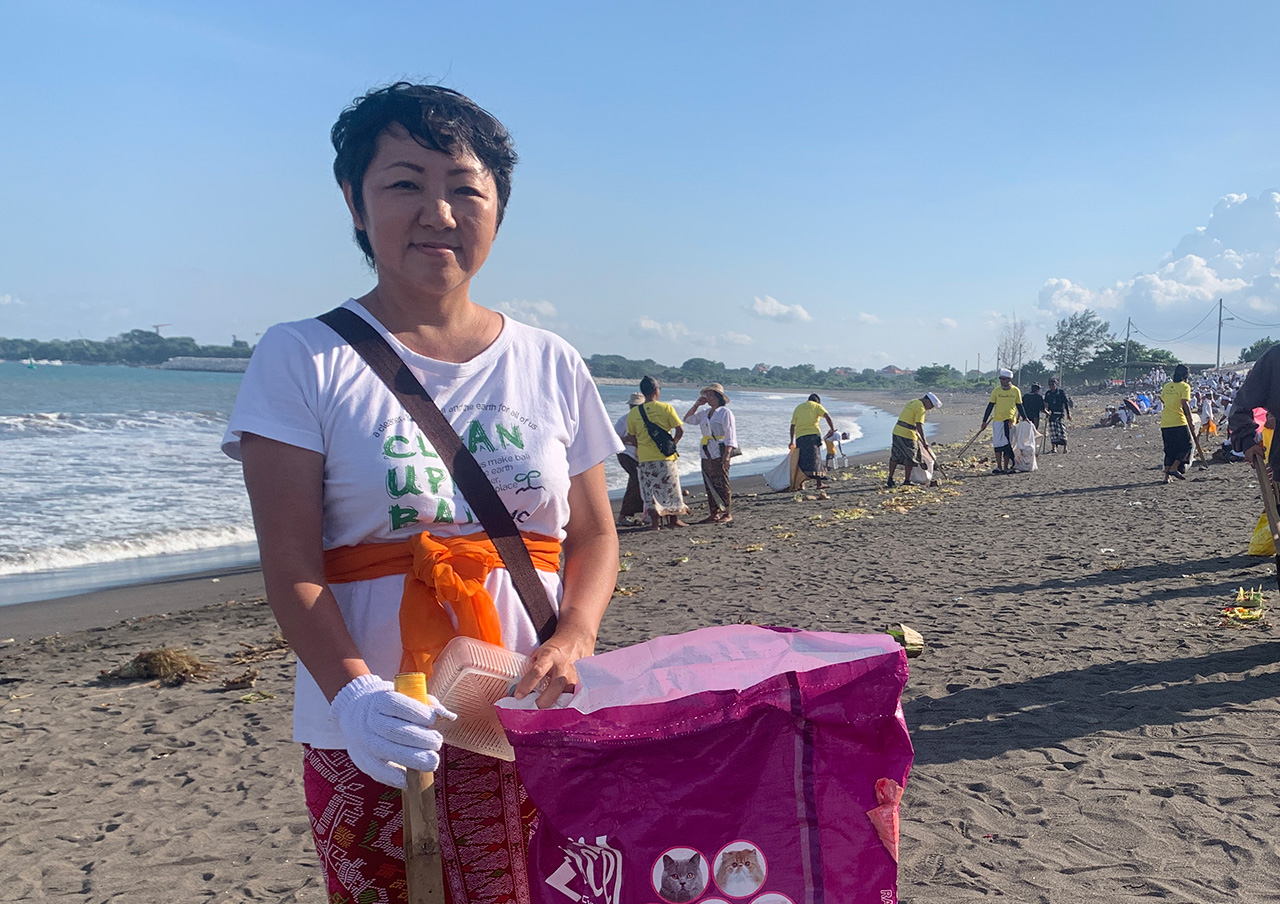INTERVIEW
【Why do you pick up trash? vol.1】
in INDONESIA

Indonesia is estimated to be the world's second-largest emitter of marine plastic waste. We visited Indonesia just before "Nyepi," the Balinese New Year.
While the whole island community came to the beach to pray, Sachiko, a representative of "Clean Up! Bali," an organization that works on marine issues, support for children, and cultural protection and awareness activities in Bali, picks up trash on the beach. The group was formed in January 2008 by members of the Japanese Association of Bali who are interested in environmental activities.
When I first came to Indonesia, unlike Japan, my place of residence is not a tourist area, so garbage collection trucks did not come at all and there was no place to throw garbage. When I asked the locals about it, they told me to just throw it out there, so I ended up littering. I had always felt “guilty” at that time, which is why I joined “Clean Up! Bali” and started picking up trash.

There is a variety of trash. Also household garbage. Characteristically, there are also many offerings used during prayers. You can find a lot of them on this beach (Padanggala Beach). Particularly now, there is more than usual because it is before the Balinese New Year “Nyepi”. In Bali, there are many people who believe in Balinese Hinduism. They are very religious people, so the amount of offerings they use during prayers increases if the ceremony is big, and I feel that the amount of offerings is also increasing because of their respect for the gods who want to offer them properly and neatly. Plastic is also used now. It is like over-packaging in Japan.

It is always humans who destroy the earth. When it comes to humans, I believe that everything comes down to cause and effect, but when I see the creatures living in the places that we humans have polluted, I feel sorry for them. That is why I feel that we, who have destroyed the environment, have a responsibility to clean up the earth.

In the wake of the coronavirus pandemic, Bali has seen a great increase in the number of people participating in garbage volunteer work. Bali’s garbage problem is serious, but this is a hope for the future.
The locals say that the cleanup activities are “helping gods (including the earth)” and they enjoy the activities. Of course, I do too. If people realize that religious teachings and environmental issues are connected, I believe that Bali’s garbage problem will be solved rapidly.
In Balinese Hinduism, there is a teaching called “Tri Hita Karana.”
This is the Balinese Hindu teaching that the happiest way for us human beings to live is to maintain a balance between the “three harmonies” of “people,” “people and nature,” and “people and gods.”
Living in Bali for many years, where customs, culture, language, and religion are different, I feel that the most important thing is to have “a heart of consideration and respect for each other. With this wonderful teaching in mind, I would like to continue working with the local people to help the island of Bali, where we are allowed to live, and the earth.

Sachiko (Real name: Ni. Komang Sachiko Candra Dewi)
Lives in Bali (permanently) since December 2000 after marriage.
Motto: Gratitude, respect, and imagination
Hobbies: Cleanup activities, blogging
Hometown: Gunma, Japan
SNS: Facebook/Instagram
Any last words?
Bali is said to be one of the most environmentally conscious islands in Indonesia! I hope to contribute to Bali in some small way in the future!
Littering occurs because of strong religious beliefs. Littering is often lumped together with malice, morals, and bad manners, but there is a complex problem of littering that cannot be solved by just that. In order to reduce such "precious garbage," the event will approach high priests and encourage them to take their garbage home with them. Through Sachiko's story of picking up trash, we learned a part of "Tri Hita Karana," the essence of Balinese Hinduism.